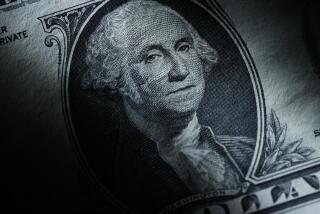These Days, Toaster Just Isn’t Enough : Finance: Banks are trying all manner of gimmicks to lure customers as skimpy passbook interest rates cut into their deposit base.
- Share via
It’s just like old times: Bankers are resorting to giveaways and gimmicks in an effort to woo depositors.
In the past several months, dozens of banks and thrifts across the country have weighed in with coupon books and gimmicky accounts that promise higher interest rates under certain circumstances. The goal is to win back depositors who have fled in search of higher returns.
But the hoopla may be wasted. Industry experts maintain that banks have lost roughly $40 billion of their $2.5-trillion deposit base during the past 12 months as passbook and certificate of deposit interest rates have fallen to historic lows.
Recession-weary consumers seem to respond only to promotions that leave them richer, rather than laden with gifts or cents-off coupons, according to industry experts.
Institutions that have tried promotions that promise “flexible” interest rates or interest “bonuses” say they’ve seen an increase in deposits. But some others that have tried less-tangible giveaways acknowledge that their promotions failed miserably.
First Federal of Michigan, for example, launched a promotion in January that promised discount coupon books to those who rolled over their certificates of deposit. The Detroit-based savings and loan planned to give out the books, which offered customers savings on dinners and theater tickets, for at least three months. But within six weeks, the thrift decided the “response was not overwhelming” and aborted the plan.
“This is the first time we’ve tried something like this since the toaster days,” said Jim Chomakos, senior vice president in charge of marketing and administration at First Federal. “But the incentive was just not big enough to keep depositors when rates continued to drop.”
Irwindale-based Home Savings of America has been offering similar coupon books to customers for some time. The thrift says the books, which were recently revised to offer more to account holders, are popular. But they are not a draw to depositors--just a perk for existing customers.
“Giveaways are really not working right now,” said Hugo Ottolenghi, editorial director at Bank Rate Monitor in North Palm Beach, Fla. “It’s a reflection of the economy. People want cash, not a clock or a radio or a color TV.”
Far more effective have been gimmicky accounts that offer odd-timed maturities and interest rate “kickers,” Ottolenghi said.
Banks and thrifts in nearly every major city are now trying these promotions, he added. Several say they’ve had great success with them.
First Union National Bank in Miami, for example, recently launched a “cap account,” which lets customers invest unused funds in their checking accounts in the stock and bond markets. That gives depositors the ability to earn significantly more than the 3% to 4% that most banks are currently paying to account holders.
In just two weeks, the bank’s South Florida offices have pulled in $80 million in new deposits, said Carlos Migoya, president of the Miami and Florida Keys Area First Union National.
In Beverly Hills, Southern California Savings introduced its “prestige CD” two weeks ago. Those with minimum deposits of $10,000 get a quarter-of-a-point interest “bonus,” the thrift says. And those who deposit more than $20,000 can tap into a number of free services, including traveler’s checks and a safety deposit box.
The bank hasn’t tallied just how much money this account has brought in, but Executive Vice President John Doyle said it has generated significant new business. The thrift considers the promotion a success, he added.
San Diego-based Homefed Bank now offers a seven-month “flexible” certificate of deposit. Those who put up at least $2,500 in cash get a half-point interest bonus, plus the ability to make one withdrawal or addition to the deposit without affecting the interest rate or incurring a penalty.
Other banks and thrifts are offering “rising rate” accounts, which guarantee the depositor a boosted rate every six months for up to two or three years; “bump-up” accounts, which promise a one-time hike if rates rise during the account period; and “indexed” certificates of deposit, where the rates change at a regular interval based on the direction of a standard index, such as prime rate or Treasury bills, Ottolenghi said.
Even with the gimmicks, savings accounts are a hard sell, bankers acknowledge. Rates are simply too low. Banks are now paying an average of 4.06% for a one-year certificate of deposit, compared to 9% in 1989, Ottolenghi noted.
“A lot of the major depositors are senior citizens and retirees who depend on interest earnings as a major source of income,” said Migoya. “These people don’t want a toaster. They want to know how they can get the best return on their money without risking the principal.”
More to Read
Inside the business of entertainment
The Wide Shot brings you news, analysis and insights on everything from streaming wars to production — and what it all means for the future.
You may occasionally receive promotional content from the Los Angeles Times.










